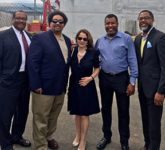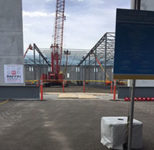New beams were launched May 2, 2018, in Chicago’s historic Pullman neighborhood when celebrants gathered for a “Wall Raising” – a groundbreaking ceremony for the new Pullman Community Center. Representatives from the Roseland Youth Center, Chicago Neighborhood Initiatives (CNI), and Chicago Community Loan Fund joined Chicago Mayor Rahm Emanuel, 9th Ward Alderman Anthony Beale, Chicago Cubs Chairman Tom Ricketts and others for the dedication of the new project, the largest of its kind in the state of Illinois.
The state-of-the-art, 135,000-square-foot Pullman Community Center, located at 10322 S. Woodlawn Avenue, will offer area youth, residents and visitors year-round athletic programs, educational opportunities and community activities. Situated on 12 acres of land previously left vacant for years, the Pullman Community Center will provide a climate-controlled environment with three indoor playing fields able to host a variety of sporting events and neighborhood functions. Annually, the Center will have the capacity to house up to 1,200 teams, welcome up to 50,000 visitors, and employ at least 100 full- and part-time area residents. Construction on the new facility is scheduled for completion in fall 2018.

(from left) Judge Fredrick H. Bates, Full Circuit Court of Cook County Judge, 6th Municipal District in Markham, Maurice Johnson, Executive Director of the Roseland Youth Center (RYC), Chelsi Cicekoglu, CCLF’s Lending Consultant, Patrick C. Watson, Staff Aide with the Office of Alderman Anthony A. Beale and Wendell Harris, CCLF’s Director of Lending Operations, meet at the “Wall Raising” ceremony for the new Pullman Community Center.
CNI is leading the revitalization of the historic Pullman neighborhood, having most recently celebrated the opening of Potbelly Sandwich Shop on 111th Street and Doty Avenue. CCLF has provided housing financing for CNI in the past and is now supporting CNI’s efforts in Pullman through Activate Retail, CCLF’s commercial real estate development initiative which offers financing and funding for transformative projects that grow retail in depressed neighborhoods in need of revitalization. CCLF received funding from JPMorgan Chase’s PRO Neighborhoods Initiative which helped launch Activate Retail and is supporting CNI’s small business lending and other commercial retail projects.
The now historic Pullman neighborhood was established in the early 1800s as a model industrial community for the employees of George Pullman’s Pullman Palace Car Company. In 1925, a group of African American Pullman employees formed to establish the Brotherhood of the Sleeping Car Porters under the leadership of civil rights pioneer A. Phillip Randolph and Milton Webster. The Porters made history by establishing the first Black union to secure collective bargaining rights and became renowned for their service as rail travel dominated American transportation. At the same time, Pullman’s industrial community attracted workers and became a model for industrialized living.
The Pullman Community has been undergoing a transformation in recent years. In 2015, President Barack Obama formally designated the Pullman Park district a national monument. Commercial retail has been growing most recently with the opening of Potbelly Sandwich Shop, Star Cleaners and Laine’s Bakery joining US Bank, Method Products and Gotham Greens in the community. A new Whole Foods Distribution Center is also currently under construction in the area, creating more job opportunities for its residents.
CCLF joins additional donors and investors in the Pullman Community Center project, including: the Chicago Bears, Cubs Charities, Chicago’s Environmental Fund, Chicago Housing Authority, the Chicago Park District, Citi, the City of Chicago, ESPN, Exelon, Ford Motor Co., LISC Chicago, National Community Investment Fund, NFL Grassroots, State of Illinois DCEO, U.S. Bank and Wintrust Financial Corporation.

Scheduled for completion in fall 2018, the Pullman Community Center will bring year-round athletic programs, educational opportunities and community activities to the historic Pullman neighborhood and will serve 50,000 people annually.